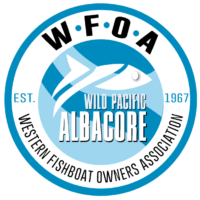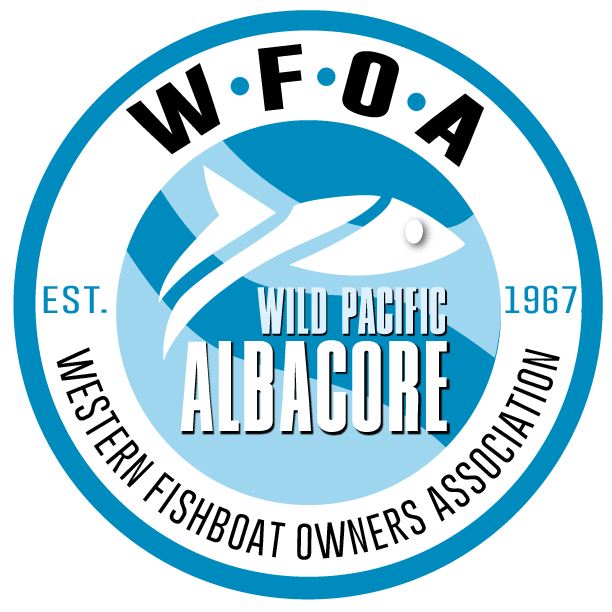FISHERIES MANAGEMENT
ALBACORE MANAGEMENT OVERVIEW
NEW – IATTC Res C-22-04_North-Albacore-Harvest-Strategy
The Western Fishboat Owners Association has long believed that management of Highly Migratory Species (HMS) such as albacore should be coordinated on an international basis. The main reason for this is that these species have no national boundaries; to manage one nation’s resources while others go unregulated or ignore new management measures would put an unfair burden on the well managed nation’s fishing communities such as the U.S.
This section contains information on past, present, and future regulation and management of HMS. Tuna and tuna-like species are being managed at all levels of government. This includes international bodies such as the Inter-American Tropical Tuna Commission (IATTC) and the newly formed Western and Central Pacific Fisheries Commission (WCPFC). The WPCFC was formed from the Multi-High Level Conference (MHLC) which involved 28 nations beginning in 1996; agreement was reached in 2000. Since then the Western and Central Pacific Fisheries Commission (WCPFC) has been formed with its headquarters in Pohnepei, FSM.
WFOA now sits on the U.S. delegation to the Western and Central Pacific Fisheries Commission (WCPFC) as well as the Inter-American Tropical Tuna Commission (IATTC). Both of these bodies are RFMO’s that regulate highly migratory species across the Pacific.
At the federal level we hold the troll representative seat on the Pacific Fisheries Management Council (PFMC) HMS advisory panel. The PFMC is now involved with HMS, especially albacore, that has been under the PFMC Fisheries Management Plan (FMP) since 2002. WFOA also works with the Western Pacific Management Council (WPFMC) and other federal bodies and agencies that are responsible for managing the resource.
International Management Bodies:
Western & Central Pacific Fisheries Commission (WCPFC): In a nutshell, the WCP Convention created a permanent Commission made up of one voting member from each participating nation (each party), as well as three separate advisory Committees (the Scientific, Compliance and Northern Pacific Committees). The Commission will design and implement comprehensive fisheries conservation, management, and enforcement systems for the high seas tuna fisheries, and also help to ensure adoption of compatible conservation programs within the Exclusive Economic Zones (EEZs) that are under the jurisdiction of various Pacific island and coastal nations.
To add to the complexity of managing an international fishery that has no boundaries most of the Eastern Pacific Ocean management is under the measures and rules of the Inter-American Tropical Tuna Commission (IATTC).
Depending on each fishery’s status and characteristics, conservation measures may include any combination of time/area closures, gear and technology restrictions, bycatch control regulations, total allowable catch limits, or fishing effort controls. Fishing vessels in the WCPFC and the IATTC Convention areas will also be required to carry Vessel Monitoring Systems (VMS) satellite tracking units and participate in observer programs.
Meanwhile, participating nations will be required to share their harvest and other fisheries data, their high seas enforcement capabilities, and lists of all vessels flying their flag and fishing within the Convention area. Each nation will be required to cooperate with one another, administer any national catch and/or effort allocations to their fleets, and implement compatible conservation and management programs within their national waters (their EEZs). It would be fair to say that the WCP Convention is the most ambitious effort to prevent overfishing ever witnessed, and it will dramatically affect dozens of countries as well as thousands of fishermen.
For more information:
- Comprehensive Management Body Site (NEW)
- Inter-American Tropical Tuna Commission (IATTC)
- Pacific Fisheries Management Council (PFMC)
- Western Pacific Fisheries Management Council (WPFMC)
- National Marine Fisheries Service (SW Region and PIRO)
- Southwest Fisheries Science Center-NOAA
General Fisheries Management, Concepts and Techniques
This section is a joint project of the Western Fishboat Owners Association and the American Fishermen’s Research Foundation. It is designed to provide an introduction to fisheries management, along with comprehensive information about the Pacific albacore tuna fisheries and highly migratory species management efforts.
MANAGEMENT BODIES:
REGULATORY CODES AND ACTS:
The following are applicable to high seas fishing vessels and the albacore tuna fleet.
- International Law of the Sea Convention
- UN Straddling Stocks & Migratory Fish Agreement
- International Code of Conduct for Responsible Fisheries
- International High Seas Fishing Compliance Act
- U.S. Magnuson-Stevens Fisheries Conservation & Management Act
- U.S./Canadian Albacore Tuna Treaty
WFOA Position Statement on albacore management:
Adopted on April 9, 1999
The Western Fishboat Owners Association (WFOA) position on Highly Migratory Species (HMS) management, as approved by the Board of Directors on April 9, 1999 is as follows:
- WFOA acknowledges as fact that the major fishing nations of the world, including the United States, Canada, New Zealand, and other nations where WFOA members reside, have already formally agreed to conserve and manage albacore tuna and other HMS, as evidenced by signing and ratification of the UN Straddling Fish Stocks and Highly Migratory Species Agreement under the 1982 Law of the Sea Convention by the aforementioned nations. WFOA’s participation in the Multilateral High Level Conference process to draft a Western and Central Pacific Convention, and active participation in numerous and pertinent efforts to develop other regional and national albacore fishery management programs, is therefore recognized as essential for ensuring our members’ continued access to the waters and fisheries of the Pacific Ocean.
- WFOA recognizes that the Pacific albacore fisheries are very healthy and that the WFOA fleet fishes in a sustainable manner with near zero by-catch. WFOA will not settle for anything less than our traditional amounts harvested over history. We recognize this would only be an issue if Total Allowable Catch and/or fishing effort control programs, with associated allocation programs, were implemented.
- Acknowledging the facts of item 1, WFOA supports the eventual and necessary involvement of the Federal Fisheries Management Councils in the HMS management process according to their expressed interests, ability to contribute scientific and management information, expertise, and resources. WFOA encourages involvement and expertise of both the Western Pacific Fisheries Management Council and the Pacific Fisheries Management Council, and will strive to work with and expedite communication between both bodies as well as the fishing community.
- WFOA recognizes that its international membership puts it in a unique position to be an advocate for the interests of the international jig fleet fishing for surface-caught albacore. WFOA will monitor and coordinate, where and when possible, with other countries and entities that have WFOA members, actions for the best interests of all. Additionally, WFOA is a California corporation, located in the United States, and therefore it is more appropriate for it to focus on the interests of its U.S. members, when and if a conflict emerges between the interests of the U.S. fleet and the interests of fleets from another flag state. Presently no such conflict exists.
- WFOA recognizes that albacore tuna is a healthy, protein-rich, staple food enjoyed and needed by millions of people all over the world, and will continue to stress this at every opportunity.

